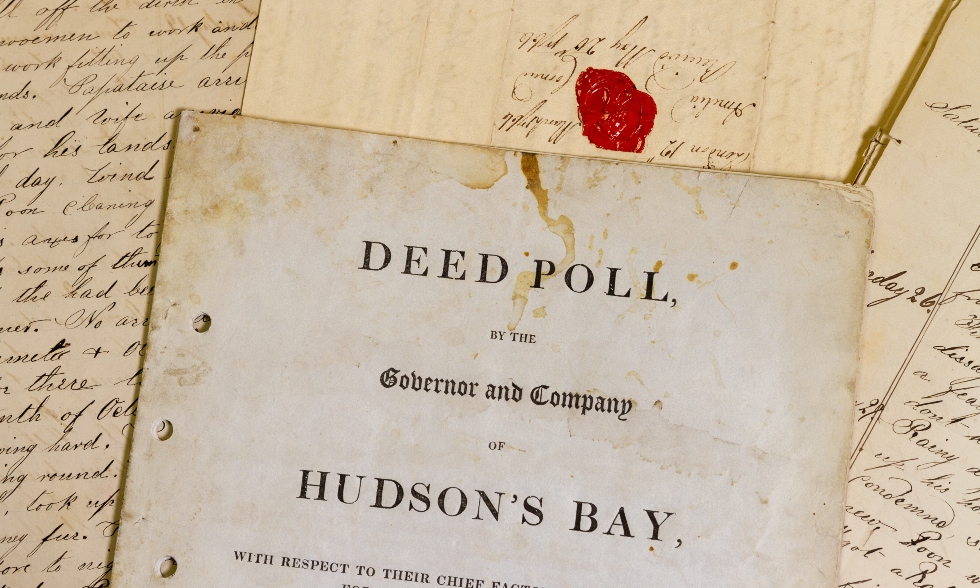“Treasure trove of documents” paints vivid picture of Canada’s historic fur trade

Through one-of-a-kind materials and first-hand accounts, the Dr. William G. Bensen Fur Trade Collection of Robert D.W. Band, recently donated by the Bensen family to McMaster University, is bringing to life this often-tumultuous period and the role it played in the formation of Canada.
BY Erica Balch
May 30, 2019
The North American fur trade. It was the vast commercial enterprise that, beginning in the 17th century, lay the economic, geographic, and cultural foundations of what would become Canada.
Over the course of centuries, it gave rise to storied and enduring institutions such as the Hudson’s Bay Company and the North West Company, and was presided over by titans of the trade like Simon Fraser, Joseph Frobisher and James McGill – names that remain familiar to many Canadians.
It was a time of discovery – one that opened up the continent to exploration and sowed the seeds of Canadian nationhood. But it came at a terrible human cost.
Many involved in the trade endured unimaginable hardships; battling the wilderness, starvation, loneliness and exhaustion in what was often a life-or-death struggle for survival.
Also, with massive profits and rapid expansion, came fierce and ruthless competition between rival firms – which resulted, at times, in violent conflict, and profoundly impacted both the lives and cultures of Indigenous peoples.
Now, a new archival collection – available to the public for the first time – is shedding light on this complex and formative period in Canada’s history.

Containing original documents and hand-written personal accounts, the Dr. William G. Bensen Fur Trade Collection of Robert D.W. Band – to be housed in McMaster Library’s William Ready Division of Archives and Research Collections – paints a vivid picture of the era, bringing to life this often-tumultuous period and the role it played in the formation of Canada.
The collection was donated to McMaster University by the Bensen Family in honour of Dr. William Bensen, a nationally recognized rheumatologist, and a McMaster faculty member and alumnus, who had a lifelong passion for Canadian history.
The collection, among the best of its kind in the country and which has been officially designated as Canadian Cultural Property, exemplifies Dr. Bensen’s desire to give back to the community and spark vibrant conversations around this integral part of Canada’s past.
“This archive is one of outstanding significance and national importance that builds on theLibrary’s existing Canadian history holdings,” says David Farrar, McMaster’s provost and vice-president (academic). “McMaster is fortunate to be the recipient of these rich materials which will undoubtedly help to foster a deeper understanding of this period in Canada’s history.”
The collection contains 109 items dating from 1649 to 1892 including correspondence, voyageur contracts, Hudson’s Bay Company (HBC) money, legal documents, commercial agreements, an extremely rare HBC recruitment broadside, and more that offer a unique glimpse into the business of the fur trade and its impact on wildlife, the landscape, and the Indigenous peoples of Canada who were an essential part of the trade.
Ian McKay, director of McMaster’s L.R. Wilson Institute for Canadian History, says these unique and rare materials are indispensable to anyone – scholars and the public alike – seeking to understand this important period in Canadian History.
“Here is a treasure trove of documents – ranging from first-person impressions to legal and commercial documents,” says McKay “Some of them preserve not only the perspectives of the powerful but those of the on-the-ground worker, and together they breathe life into the history of the fur trade – a time period in which so much of modern Canada took shape.”
“For many years the Bensen family have been valued friends of McMaster University,” says Vivian Lewis, McMaster University Librarian. “This gift was inspired by Bill’s great love of Canadian history and his desire to share that history with others. We are honoured to be the custodians of this truly remarkable collection and to make it available to scholars and members of our community for generations to come.”
Among the original materials contained in the collection are personal letters and diaries written by key figures in the trade such as Simon Fraser, George Simpson, and the Frobishers, as well as documents written by lower level employees, law clerks, and indentured labourers that describe their experiences and working conditions in the fur trade.
The collection also includes rare legal records from the era, including a court attestation detailing allegations of sabotage and murders that were committed at the Red River Settlement as rival companies vied for control of the fur trade in that area.
“This collection provides unparalleled insights into the evolution of the fur trade,” says Myron Groover, McMaster’s rare books librarian. “The documents pertain to some major players in the trade and to some very significant trading concerns. In many cases, we’re looking at manuscripts that are coming straight from the pen of a clerk, or an individual directly involved in the fur trade – that’s part of what makes this collection really special.”
The Dr. William G. Bensen Fur Trade Collection of Robert D.W. Band joins a number of other archives at McMaster that shed light on the social, cultural and military history of Canada. These include McMaster’s Canadian Literature Collection – featuring the archives of Farley Mowat, Pierre Berton, Jack McClelland and many others – and McMaster’s renowned collections of First World War and Second World War archives and trench maps collections.
Please join us on Tuesday, June 4thfor a special celebration in honour of this gift which will feature acclaimed Canadian author Ken McGoogan and his public lecture, “Rogues, Rascals and Kings: Fur Trade Adventures Spring from the Archives.” Learn more or register


